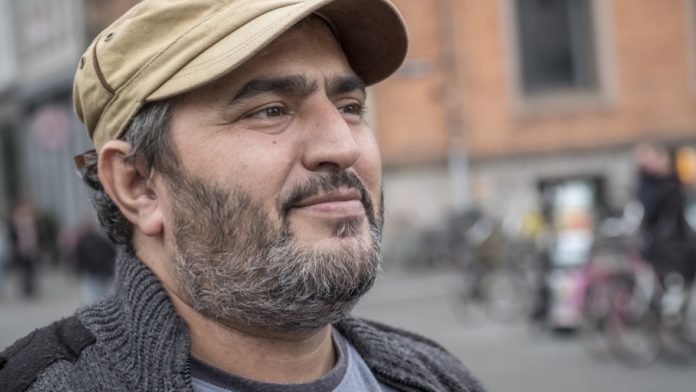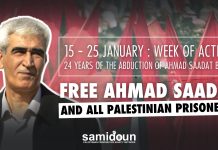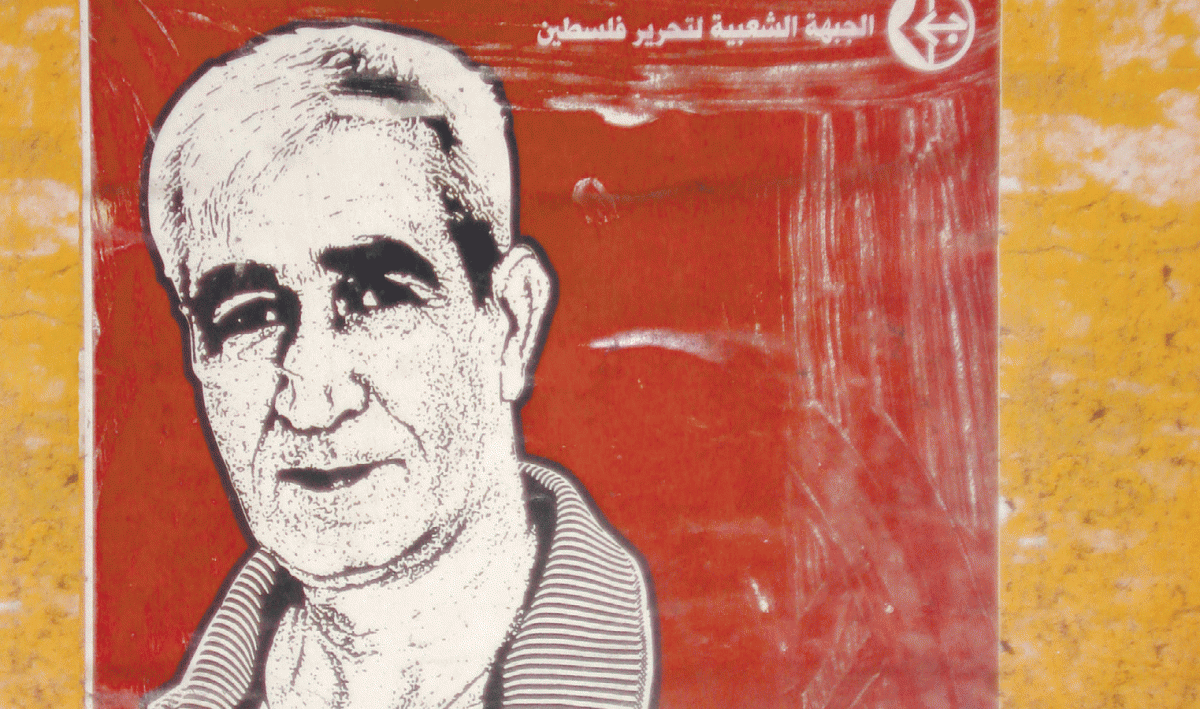The following interview with the international coordinator of the Campaign to Free Ahmad Sa’adat, Palestinian leftist writer Khaled Barakat, was originally published in Danish by Arbejderen, the Daily Worker, on Tuesday, October 9, 2018. The English translation follows below:
Khaled Barakat is a Palestinian writer and coordinator of the campaign to free Ahmad Sa’adat, the imprisoned General Secretary of the Popular Front for the Liberation of Palestine (PFLP). He does not think highly of the US role or its president Donald Trump’s forthcoming “peace plan” for the 21st Century Middle East.
Palestinian Khaled Barakat shakes his head as he visits the Arbejderen editorial office and the conversation turns to the United States and its president.
President Donald Trump has promised that his administration will soon come up with the “Deal of the Century” for resolving the conflict between Israel and the Palestinians.
Trump wants the question of the Palestinians to be completely taken off of the table, in order to shift focus to the fight against Iran, he says.
The 46-year-old Khaled Barakat is a left-wing Palestinian, an author and the coordinator for the Campaign to Free Ahmad Sa’adat, the imprisoned PFLP General Secretary.
PFLP stands for the Popular Front for the Liberation of Palestine, and it is on both the US and EU terrorist lists, although the organization is the third largest political force among all Palestinian groups, next after Fatah and Hamas.
The PFLP is the largest Marxist Palestinian resistance organization.
Deal of the century?
With his “deal of the century,” Trump has included nothing really new.
The US said, after it moved its embassy to Jerusalem from Tel Aviv in May, that Jerusalem is Israeli and that it is no longer an issue on the negotiating table.
Trump’s claimed plan is empty talk, said Khaled Barakat in a conversation with Arbejderen.
According to the Israeli media site DEBKAfile.com, the main point in Trump’s grand deal rely on the West Bank and Jordan becoming a confederation. This suggestion came indirectly from the US last month.
In addition, Trump’s plan would give Palestinians limited sovereignty over half of the occupied West Bank and proposes to appoint the city of Abu Dis, east of Jerusalem, as a new Palestinian capital, while maintaining Israeli settlements in the West Ban and Israeli control over East Jerusalem.
For decades, the Palestinians have held as a main requirement that Jerusalem should be the capital of a Palestinian state.
“The primary reason that Trump is raising this plan is that the traditional Palestinian leadership under the authority of Mahmoud Abbas is so week and toothless, having surrendered completely on all political levels,” said Khaled Barakat, known to discuss the perspectives of the PFLP and share their analyses.
Broken Middle East
Barakat adds that another reason is the serious situations facing Palestinians in Gaza and elsewhere under occupation. Everything is smashed; the economy is in ruins.
“The Palestinian capitalists accept the so-called self-rule government in order to ensure their own petty interests, in exchange for any real independence or self-determination,” said the Palestinian, who is on a tour of Europe to discuss the situation.
This “self-rule government” is led by the political party Fateh, which in the view of Khaled Barakat, represents the Palestinian bourgeoisie.
Khaled Barakat also believes that Trump is only able to present his so-called peace plan because the Arab world is politically crushed and plagued by bloody wars and turmoil.
“Look at Libya, which has been totally smashed by the bombs of the West. Imperialism rages around the world, especially in the Middle East,” the Palestinian says. According to Khaled Barakat, strong powers have come together to shift focus away from the struggle in Palestine.
“Zionist Israel, imperialists in the United States and other Western powers and the reactionary Arab regimes, represented by Saudi Arabian crown prince Bin Salman, have come together to attempt to break the Palestinian cause. They want the issue off the table completely, in order to shift the focus to the fight against Iran,” says the Palestinian.
Criticism of the Oslo Agreements
But the Palestinian is also very critical of the Palestinian Authority (PA), which manages parts of the Israeli-occupied West Bank.
“Palestinian police coordinate actions with the Israeli occupying power. It is completely unacceptable. Fateh has played its current political role especially since 1993, when the Oslo process came to the forefront,” Khaled Barakat said.
The Oslo agreements, which Palestinian president Yassir Arafat signed on behalf of the PLO, recognized Israel. On the other hand, they said that Palestinian autonomy should be established over a five-year period in the West Bank and Gaza, while Israel would withdraw from the occupied territories.
Israel broke all of these promises and finally cut off negotiations in 2010. From the Oslo agreement in 1993 until 2000, the number of settlements doubled.
“Now, 25 years after the Oslo agreements, we can see that we have lost everything. Even more, the PLO lost its status as the sole legitimate representative of the Palestinian people,” Barakat said.
He touches his cap, hesitates, looks a bit sad, but continues on energetically.
“The PA leadership and the Palestinian capitalist project have killed the essence, stripped the very core of the PLO. Today, Mahmoud Abbas and his wing have hijacked the so-called Palestinian leadership. Decisions are no longer taken by the PLO, but by the PA,” criticizes Khaled Barakat.
The Palestine Liberation Organization (PLO) is an umbrella organization that brings together Palestinian political organizations, ranging from Fateh to the left-oriented DFLP (Democratic Front for the Liberation of Palestine) to the Marxist PFLP. Hamas, which is Islamic, is not part of the PLO.
Khaled Barakat believes that the PA likely cooperated with Israel and other parties in the arrest and imprisonment of PFLP leader Ahmad Sa’adat in 2006 in the West Bank. British police guarded his prison for the PA but left it abruptly on March 14, 2006. Then Israeli soldiers entered, kidnapped the PFLP leader and brought him to Israel. Here he is sentenced to a life-threatening prison sentence for terrorism by an Israeli military court.
Barakat states that the Oslo agreements obligated the PA to work with the Israeli occupation on security and intelligence matters. For example, he notes that the United States financed the training of Palestinian security personnel in Jordan, the USA and Israel. In addition, Barakat believes that Palestinian NGOs in the West Bank and East Jerusalem play a very particular role.
“I believe that donor money came to exercise control. From the EU, USA and reactionary Arab regimes, they consciously focused on NGOs as instruments to dominate Palestine. The EU and US actually divided the task between themselves. The US financed the PA’s security services while the EU funded civil NGOs,” says the Palestinian.
Self-Criticism
Despite his criticism of the PA leadership, the Palestinian sees that the Palestinian people are at the stage of the national liberation movement, a stage in which it is urgent to bring together all national forces, not only the Left. However, he believes that the Palestinian left wing must sharpen its tone in relation to Fateh, in particular.
“The PFLP must undertake self-criticism in order to support the internal struggle, including that in the trade union movement – not having escalated the struggle against the Palestinian bourgeoisie. For example, we rarely see the left taking the initiative to organize workers’ strikes. This must be changed,” Barakat says.
Despite the powerful opposition nationally and globally facing the Palestinian liberation struggle, Khaled Barakat believes that there is definitely light at the end of the tunnel.
“In Gaza, since March 30, there have been extensive protests for the right of Palestinians to return to their homeland, where their parents or grandparents were expelled from in the 1940s. Many of the young people protesting in Gaza as part of the Great March of Return can, with their own eyes, see the villages their families came from, but are now part of Israel.”
For Khaled Barakat, the Israeli military’s shootings of civilian Palestinians in Gaza participating in the return marches have been an “eye opener” for many outside Palestine who before that time had not participated in supporting the struggle for freedom or the boycott of Israel. Since March 30, 193 Palestinians have been shot down and killed.
“Israel and the Western media – probably also yours here – claim that Hamas sends civilians to the borders to fight. In fact, it is all Palestinian political groups and more working together on the Great March of Return, especially Hamas and the PFLP. Cooperation is necessary as it is inside the prisons, and political differences are not allowed to affect the political unity.”
He believes that the events in Gaza give a major boost to the boycott movement and the BDS campaign (boycott, divestment and sanctions).
“Israel is a racist, colonial state that is doomed to dissolve. I believe that at one point Israel will become a burden for imperialism, as we have seen elsewhere in world history, such as in South Africa.”
Hope in the Total Boycott of Israel
Khaled Barakat smiles for the first time during this interview.
“BDS is especially a strong movement outside Palestine. In addition, the boycott movement includes more than the BDS campaign. For example, Boykot Israel in Denmark was formed in 2002, that is, three years before the BDS call, to support a general boycott of Israel: economic, academic and cultural.”
“BDS has three demands: end Israeli apartheid, end the occupation and refugees’ right to return. These are only minimum requirements, and not the maximum program – that is, liberation,” says Barakat.
“But BDS is an important movement because it addresses major multinational corporation and organizes campaigns that can lead to victories,” such as the campaign against G4S, said Barakat.
The Palestinian, living in Beirut, hesitates once more, but ends with a big smile.
“The boycott movement was important to the fall of the apartheid regime to South Africa. The same will apply here!”
PHOTO: Aage Christensen, Arbejderen








